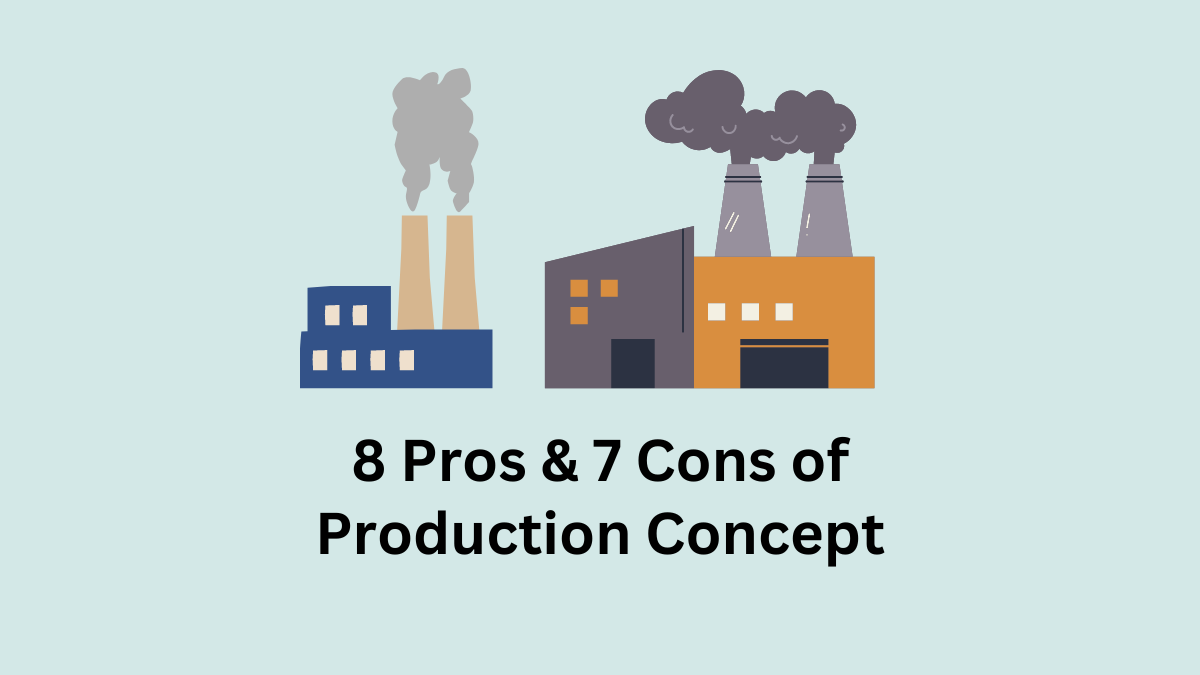Pros and Cons of Production Concept
The production concept is the marketing philosophy that relies on the belief that people buy product that has lower yet affordable prices. As such, it emphasizes companies to focus on mass production and earn profit through production efficiency.
Let’s explore some pros and cons of production concept of marketing.
Pros of Production Concept
The Production Concept of marketing offers various advantages to businesses that help them to achieve their marketing goals efficiently. Let’s explore some of them.
Cost Efficiency
One of the primary benefits of the Production Concept is its ability to achieve cost efficiency through mass production. Since companies produce larger quantities of goods, their cost per unit decreases due to economies of scale. This reduction in production costs allows them to product’s price lower, which directly benefits consumers. As a result, more individuals can afford the products, leading to increased sales volumes.
Wider Accessibility
With its emphasis on abundant production, the Production Concept ensures that products remain consistently available in the market. This reduces the likelihood of shortages, thus meeting consumer demand effectively. The availability of products creates a sense of reliability among customers, enhancing their trust in the brand’s ability to cater to their needs consistently.
Related: The 4 Cs of Marketing
Quick Market Penetration
The Production Concept enables businesses to rapidly penetrate new markets. By producing substantial quantities of goods, companies can cater to a larger audience in a shorter time frame. This approach is particularly valuable when demand outpaces supply. Rapid market penetration allows companies to establish their presence swiftly and capitalize on emerging opportunities.
Profit Maximization
The Production Concept’s focus on mass production often leads to greater sales volumes. Increased sales contribute to higher revenue and, subsequently, improved profitability. This is particularly attractive for businesses seeking ways to maximize their profits by addressing a wide consumer base.
Job Creation
Mass production demands a larger workforce to handle the increased production volumes. This aspect of the Production Concept contributes to job creation, providing employment opportunities to a significant number of individuals. As companies expand their operations to meet consumer demand, they simultaneously contribute to the overall economy by reducing unemployment rates.
Global Competitiveness
By offering products at more affordable prices, companies embracing the Production Concept can effectively compete on a global scale. Lower prices make products attractive to a broader range of consumers, increasing the company’s market share. Moreover, the ability to offer competitive prices enhances the potential for export opportunities, further expanding the company’s reach.
Read Also: 3 Ps of Marketing Mix
Operational Efficiency
The Production Concept’s emphasis on production efficiency often results in streamlined operations. By optimizing manufacturing processes and minimizing waste, businesses can operate more efficiently. This efficiency extends to other aspects of the business, such as supply chain management and distribution.
Simplicity
One of the most straightforward marketing approaches, the Production Concept simplifies the strategy by centering on production and distribution. This approach resonates with basic consumer needs, particularly when affordability and product availability are crucial factors. The focus on simplicity aligns with the principle that consumers are attracted to readily available and reasonably priced products.
Cons of Production Concept
While the production concept offers several benefits to businesses, it also has some drawbacks. Let’s explore the 7 key disadvantages of production concept of marketing:
Related: The 4 Ps of Marketing Mix
Neglecting Customer Preferences
The Production Concept’s primary focus on mass production and cost efficiency can lead to overlooking customer preferences and needs. Prioritizing quantity over customization might result in products that don’t resonate with consumers, leading to decreased sales and customer dissatisfaction.
Limited Innovation
The emphasis on producing large quantities of standardized products may hinder innovation. Companies might become complacent in refining and upgrading their offerings, as their primary goal is to maintain low costs and high production volumes. This lack of innovation can make products close in a rapidly evolving market.
Quality Sacrifice
While mass production reduces costs, it could lead to a compromise in product quality. The rush to produce in large quantities might result in overlooking quality control measures, leading to subpar products that fail to meet customer expectations and degrade the brand’s reputation.
Market Saturation
Overemphasizing mass production can flood the market with products, causing oversaturation. When supply outweighs demand, businesses might find it challenging to sell their entire inventory, leading to potential losses and unsold products.
Read Also: Needs, Wants, and Demands in Marketing
Inflexibility
The Production Concept’s approach is less adaptable to changing market trends and preferences. Companies might find it difficult to shift their production lines quickly to respond to emerging consumer demands, potentially missing out on new opportunities.
Environmental Impact
The relentless pursuit of mass production without considering sustainability can have adverse environmental effects. Overproduction can result in excessive resource consumption and waste generation, contributing to ecological concerns and consumer backlash.
Lack of Customer Connection
The Production Concept’s primary goal is efficiency through mass production, often neglecting the customer connection. Companies might miss opportunities to engage with their customers, understand their preferences, and build lasting relationships, ultimately impacting brand loyalty.
Read Next: 5 Core Concepts in Marketing
Arti Kushmi holds a BBS (Bachelor in Business Studies) degree and shares her business and marketing knowledge through this website. While not writing she will be reading and enjoying the moment.
